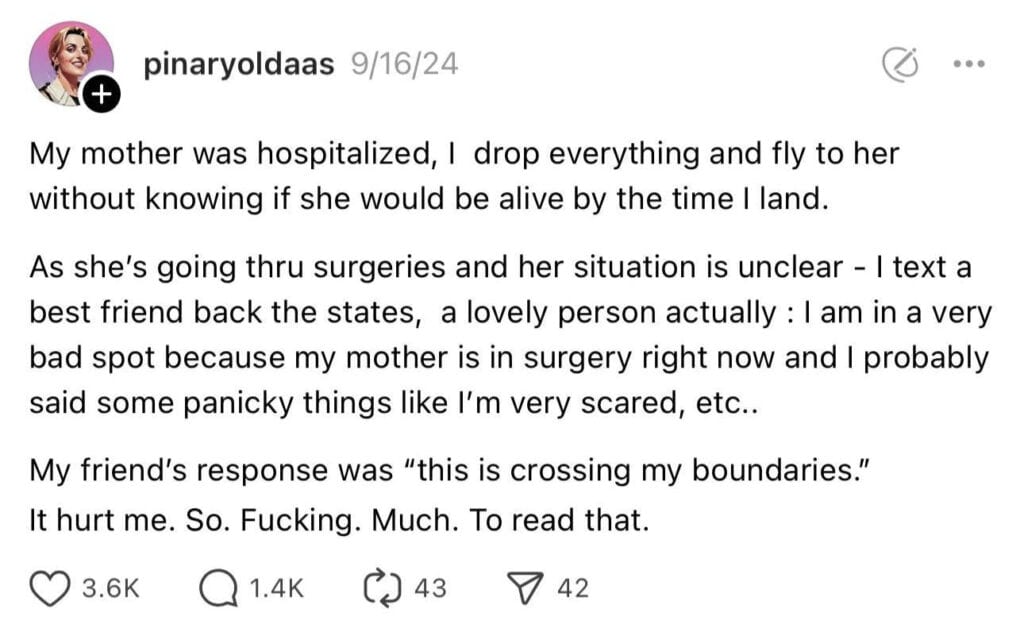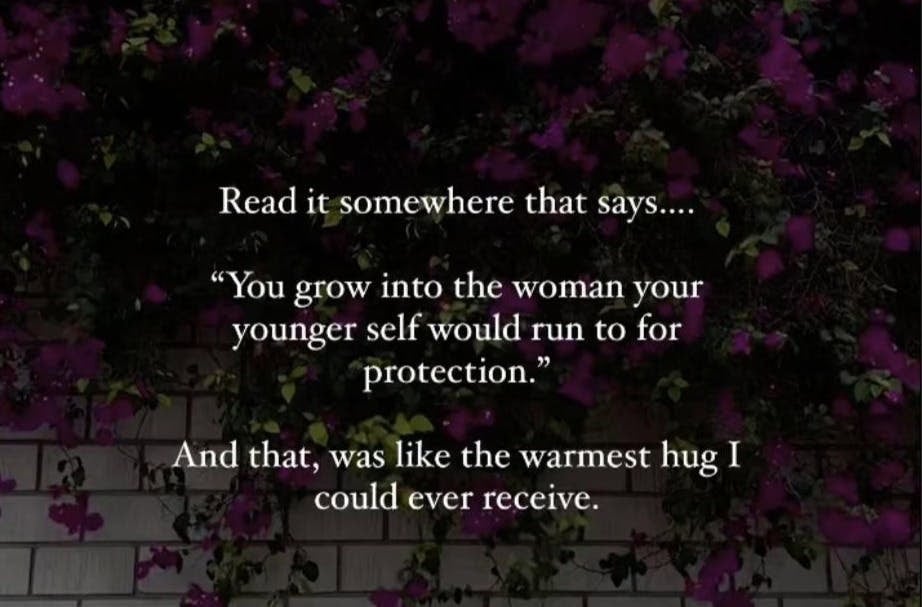Is Therapy Speak Out of Control?

Let’s Recap The Friend Breakup:
Last week, I wrote about my experience with the Friend Breakup, which sparked a lot of conversation here, here, and here. I recounted two friend breakups: one in which I was the dumper and another in which I was the dumpee. In the case of the former, I had a face-to-face conversation with my friend, explaining to her why I felt our friendship needed a break. We then parted ways for almost a decade, after which we reunited as perhaps not “friends,” but as “friendly.”
In the case of the latter (i.e., wherein I was the dumpee), my “friend” did not give me the courtesy of telling me what I had done to be emotionally exiled from her life. She simply “ghosted” me, in today’s parlance. Many many months later, I worked up the courage to reach out to her, hoping either to reconcile or at least have a conversation about what it was that upset her so much. She politely declined to engage with me on the subject (or any other subject). We haven’t contacted each other since. To this day, I do not know what caused the complete 180 in our relationship.
Is There A Right (Or Wrong) Way To Handle A Friend Breakup?
Since going through the agony of being on the receiving end of a friend breakup, I’ve reconsidered every single friendship I haven’t sustained–by intention or otherwise. Did any of these friendships sputter because I inexplicably ghosted someone? And in those instances where I had very specific reasons for the friend breakup, was I clear and fair in the way I handled the dissolution? Implicit in this re-excavation of the not-small cemetery housing the bones of my platonic relationships is the notion that there is a “right” and “wrong” way to handle a breakup of this kind.
I’ll be clear (if I wasn’t already): I believe in due process. If I’m going to cut someone I consider to be a close friend out of my life so abruptly, as cleanly and completely as a divorce, I think that person is entitled to an opportunity to be heard. In the same way the law affords us a right to confront our accusers, we should all be allowed to “say our piece” before being permanently cast the villain (obviously, there are exceptions for abuse, criminal behavior, or other patently dangerous situations). Hence, even at the tender age of 13-years old, I met my soon-to-be ex-friend at the parking lot steps and told her, through tears, why I could no longer be her friend. I was prepared to hear her out, but she elected not to exercise her right to speak.
I’m fairly certain that the friend who dumped me believes she was well within her rights to ghost me (she was quite civil in her refusal to discuss the demise of our friendship). During my time on the “emotional hamster wheel,” I had a lot of trouble reconciling my personal beliefs on the “right way” to handle this with what I assumed was my former friend’s implementation of “boundaries.” Though I can’t be certain (since she refuses to talk to me), I believe she erected the wall between us in order to protect herself from some perceived threat or even just plain old unpleasantness that my presence in her life injected.
I generally respect a person’s right to preserve their mental health and well-being, but what about me? Were my feelings–which had been shredded so absolutely I could barely recognize myself–were my feelings irrelevant? Must empathy and kindness take a backseat to even the slightest imposition on one’s ego, a mere thumbprint on the forcefield of self-preservation?
“But I’m Just Setting My Boundaries.”
I received countless messages from kind, well-meaning people who expressed shock and disbelief at the emotional wreckage evidenced in the comments to my Instagram post by those who’d been ghosted and dumped. They second-guessed the way they handled their friend-breakups, wondering if perhaps they could have been kinder. I like to believe that maybe my friend just doesn’t know how much her behavior impacted me, how it threw me into a reckoning of self-worth I was ill-equipped to handle. Others confessed that “ghosting” was not necessarily their choice at all, but was forced on them by an abusive partner. This, of course, had never occurred to me and I am almost certain it isn’t applicable to my situation (though I don’t want to discount it as a possibility for others). And still others suggested that there was nothing wrong with ghosting a friend, if doing so was a matter of “setting healthy boundaries.”
A few weeks ago, I went on a bit of a rant about texting. One of my gripes with texting is that it has legitimized the avoidance of hard conversations. Don’t want to deal with the fallout of a breakup? Simply text them and block them. Not coincidentally, with the advent of “social media therapy,” concepts typically confined to the four walls of a session between a therapist and their patient, have been repurposed and, in some cases, weaponized to absolve people from any accountability: “I don’t want to deal with the consequences of my unkind behavior towards you, so I’ll characterize it as ‘boundary setting.'”
But consequences, here, aren’t limited to the other person’s anger, tears, or repeated appeals of innocence. As distressing as those might be to have to confront, far more uncomfortable for some is coming face-to-face with the idea that what they did isn’t particularly good. “Boundary-setting” conveniently drops a cloak over the mirror, one that might otherwise reveal that they’re not the nice, kind, empathetic, generous person they thought they were. That they’re not strong, honest, and fair. But instead, the reflection might show someone who is a little bit unkind, manipulative, selfish, and weak.
Make no mistake, friends. Empathy, compassion–those are not for the weak-willed. Ask anyone rescuing dogs, running a sanctuary for animals, sitting on the other end of a domestic abuse hotline. It takes profound courage, mettle, and discipline to extend our emotional bandwidth beyond the everyday, to drop our egos for a bit and lay ourselves bare to the slings and arrows of accountability and, yes, friendship.
Because friendship doesn’t work without accountability. It doesn’t work without mutual respect, trust, and forgiveness. It doesn’t work without work.
The post at the top of this newsletter is boundary-setting run amok, an appalling example of how therapy-speak was used to provide complete immunity from any accusation of being unkind, unempathetic, disrespectful, or even just impolite. Because the rebuttal will certainly be, “I’m entitled to protect my mental health.” And though it’s rarely said out loud, the end of that handy defense is “even if it disproportionately damages yours.”
I have much more to say on this subject, but a lot of it remains unformed. I’d like to do some more reading and will be chatting with a friend of mine (one who would never ghost me!) who is studying to be a licensed therapist before I continue to share my thoughts with all of you. In the meantime, what do you think? Has “boundary setting” gone a step too far? Are there other concepts falling under the umbrella of “therapy speak” that have spawned unintended consequences? What are the circumstances in which you think it is okay to ghost a long-time friend?
FREE E-Book: Seven Spectacular Side Dishes!
In case you missed it, I spent the last month developing, filming, writing, and putting together Seven Spectacular Sides, my new e-book for you to cook from for your next holiday party. Because, let’s face it–the best dishes on the table are almost always side dishes!!

If you’re already subscribed to my newsletter, the direct link to my e-book is in your inbox. If you’re not subscribed, click the button above to get cookin’!!
Parting Thoughts

Earlier today, I came across an Instagram Reel with the following quote:
“You grow into the woman your younger self would run to for protection.”
Like the creator above notes, this idea is comforting in a lot of ways. It suggests that our lives are pointed in the right direction by default, that our past hurts and traumas serve some meaning. They make us stronger and better people.
The truth is, I misread this quote the first time I saw it. I subconsciously inserted the phrase “Aim to grow into the woman…”
I still found it comforting. Because it illuminated a very specific purpose, one that was as concrete as all the things I grew up being afraid of. All the things I’m still afraid of. I could easily perform a comparison between the woman I’d run to for protection and the woman I am today. I was happy to discover that so much of them overlapped. Yes, younger Joanne would definitely feel safer around Lawyer Joanne. And even as I write this down, I wonder how much of this subconsciously nudged me towards a career in law. And yes, younger Joanne would feel soothed by Aunty Joanne, the woman who waves her knife around while yelling at people about self-love, confidence, heartbreak, and the ongoing fight against the ills of this world. I am protective of those I love–fiercely so–because a part of me wishes, so badly, she had someone like that in her own life.
But the comparison isn’t perfect. There are parts of me, today, that even younger Joanne might view with skepticism. I am plagued with self-doubt, still far too reliant on the opinion of others in deriving conclusions about my worth. I am too shy. Yup, I said it. I’m too shy! I shrink in crowded places, instinctively, believing in my core that I’m not good enough to physically be included in certain spaces. And when I think of younger Joanne? I want to tell her, categorically, You belong in all the spaces you will earn.
And thus, the comparison, while imperfect, remains a good one. I know, now, the gaps that must be colored in. The areas that require attention before I am truly the woman I know I can be.
Wishing you all the best,
Joanne






Joanne, thank you for being so open, what you are feeling is what many of us have and are going through.❤️
I agree that therapy-speak has gotten entirely out of control and out of context.
I am deeply frustrated and find myself growing increasingly irritated by younger friends and acquaintances who throw words like ‘trauma’ and some other words I have (until somewhat recently) never heard utilized outside of my therapy sessions around in casual conversation. In my opinion – throwing therapy-speak around dilutes and trivializes actual trauma work being done in clinical settings, and too often provides people with an entirely too easy cop out, so they can passive-aggressively avoid the conflict required of excising friendships that no longer serve them from their lives in-person.
It is, after all, much easier to Marie Kondo your social calendar of people you don’t actually like, when you can just say, “You’re violating my boundaries and causing me trauma,” than it is to say to someone’s face, “I don’t think this friendship is working out.”
My generation (Millennial) and my daughter’s (Gen Z) have become too comfortable with conflict avoidance to a nearly pathological extent. They’re also allergic to picking up the phone- which is annoying as well, since I am a talker and prefer the sound of someone’s voice, to trying to determine tone from a sparsely worded text message.
I really appreciated and identified this weeks topic on weaponizing therapy speak. I have been in recovery (both AA and alanon) for a decade so I see this a lot first hand. I started in AA for about five years..after repeated nudges from my AA sposnor I finally started going to alanon. If you are not aware alanon is for friends and family effected by the disease of alcoholism. One of the more frequent topics is boundaries- learning how to set them, unlearning a lot of ideas picked up about what they are and are not. Because our culture teaches us that saying “no” is unkind or bad and if you do it will cause consequences, etc. So…learning how, when and why to set boundaries was and is huge. Also unpacking a ton of misinformation about what they can do. So for me, boundaries are important. they are not ultimatums. A boundary or having boundaries means that you can trust me to tell you what I want and need, I will do what I say I will (because I do not say yes to things I will not do). Overall learning boundaries has made me a much more honest person (honest in that I will share with you the truth of me, not using honesty as a pretense for sharing my judgy opinions). Because of all of this it saddens me to see boundaries used as an excuse for shitty behavior considering what they can and should be doing. There is an old Metric sound with a line that goes “dont say yes if you cant say no”. to me this is the epitome of a healthy boundary litmus test. The nature of socials means that whatever messaging there is must be condensed down to sound bites. Sound bites by definition lack nuance. Consequently, we live in an exceedingly all or nothing, only this way or that way world. Nuace and reflection take more than 20 seconds or 140 characters. BTW the applesauce in the cake recipe this week is missing a quantity (my partner noticed this and said we should share).
Yes, absolutely. Therapy-speak is out of control. I see the term and concept of boundaries mis-used almost every day. And, as you said, it’s being used as a way of excusing poor behavior, including not dealing with things you don’t want to deal with, as well as to justify selfish modes of living. Originally, having strong boundaries was laudable, and I appreciated hearing people talk about their own personal boundaries. I admired it and strove to recreate it in my own life. Today, though, probably because of social media, most of what I hear is just a me-centric way of living.
Starting at the age of 7, I was homeschooled through a correspondence program. My best friend was a pen pal who was also homeschooled through the same program. I was very emotionally close to her and we exchanged really long and frequent letters for about 5 years until she suddenly cut off contact. She sent a final letter, said that she wouldn’t be my friend any more, and refused to respond to any letters I sent ever again. I was 12 years old then; that was 35 years ago. I am not exaggerating to say that that experience has caused me a lifetime of doubt when it comes to friendships. I tried to get in touch again when I was in college and located her online. She didn’t reply. It was devastating all over again.
Please give friends the benefit of a “closing exchange” the way Joanne did! Thanks for writing about this issue (and so many others).
I recently had a similar experience where a good friend vanished. Our last interaction was a phone call, and after that she stopped communicating with me. After a few unanswered texts, I reached out specifically asking what I had said that was offensive or problematic; I apologized for anything that might have come across as insensitive. No response. I’ve been wracking my brains and beating myself up. If she had just called me out in real time, we might still have a friendship. So frustrating to be dumped without ever learning why. I’m sure she’s moved on without losing any sleep, whereas I spent an inordinate amount of time feeling I was the issue, that I was such a bad person I couldn’t even identify what I had done. Thanks for making me realize my situation isn’t that unique.
I really like that you brought this up, because ‘boundary setting’, much like a lot of other important words in our socio-emotional health, is often misappropriated or overgeneralised. It’s good to examine ourselves honestly and consider where we stand – not just in our opinions or principles, but also our past/present actions. I think many of us fall short of the person we aspire to be, though that should also be evaluated and considered with some compassion.
That being said, those boundaries – how do we really set them? After my close friend’s first cat died, she was understandably devastated. Four days of increasingly erratic messages and voice messages followed, across the continent and ocean, from the East Coast to East Asia. On the fourth day, while responding to another barrage of texts between my lessons (I’m a high school teacher), I had to say “you need to speak with your therapist. Make an appointment, RIGHT NOW. I just can’t help you any further at this moment” when I found out she hadn’t spoken with her therapist ‘because the appointment is in two weeks’. I still feel quite guilty about that, and the post that stimulated this post reminded me of that day. What do we expect out of our friendships when we are in crisis? Are common threads of ‘friendship’ able to survive in a rapidly-changing landscape for people? Where do we learn the messages of friendship, and get a chance to look at how friendships come in different forms?
There’s no real conclusion to this, because I haven’t quite figured it out yet. What I can say is that I am very glad my friend resisted very little before contacting her therapist that day, and that our friendship survived and thrived.
Thank you for another thought-provoking post 🙂
The issue is that boundaries are for YOU to control YOUR behavior, not someone else’s. So, if you say, “If you do X to me, I will do Y”, your Y action is supposed to be something about you, like ending a conversation, leaving the room, etc. People use their Y action to control X’s behavior. Once that happens, it’s not a boundary, it’s a control tactic. I think boundary givers forget that point and want to control behavior, rather than the giver’s response to the behavior.
Varuna, I actually read several interesting articles that say very much the same thing. In one, the psychologist notes that a controlling boyfriend used the “these are my boundaries” excuse to forbid his girlfriend from hanging out with her friends. It’s an extreme example, but it’s right in line with what you’re saying. It’s interesting how these concepts are now being used to excuse or justify clearly inappropriate behavior.
Dear Joanne,
I believe everyone is going through stuff, we cannot know. So rules of engagement don’t apply. There are simply people that are not meant for us. We just have to let them go about their business, there is nothing to fix. And it probably is none of our business 🤷 😕 🙃 . And not about us.
I’ve been on both sides as you speak of, the most recent is clearly not about me, and so I have had to learn to live with it.
I wish you lots of clarity so you can go meet the joyous new people that are meant for you ❤️